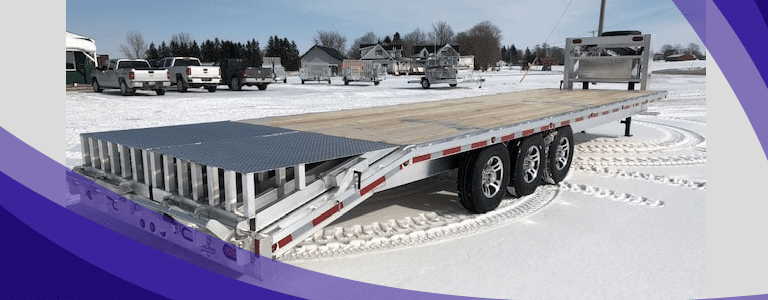
August 7, 2020 Last updated on June 16, 2023 by Bob Fisher Bob Fisher Aluminum Trailers
While you should always be careful when towing a trailer, winter weather adds a new element to your safety plans. Snow, ice, and fierce winds can all create hazards that make your tow more difficult if not potentially dangerous. It’s easy to say to avoid towing during these colder months, but that’s not always possible. Safety is always the name of the game. To that effect, we offer below six tips to help reduce risk and better ensure that you and your cargo arrive safely at the intended destination.
Create a Plan
We’ve all become used to tossing the address of our destination on our phone and hitting the road. However, when it comes to potentially hazardous weather, you should prepare for your trip in advance. Use the map app on your phone or GPS to better understand your route. Know where you’re planning to make pit stops and examine routes for potential hotels or other shelters should the weather be bad enough to take you off the road.
If your trip is long enough, it makes sense to bring an emergency kit with you, too. The kit should include items essential for survival:
Inspect Your Tow Vehicle
After you’ve prepared yourself for the drive, you need to prepare your car, truck, or SUV, too. If there’s any upcoming routine maintenance, make sure to get it taken care of before your drive. An essential part of this maintenance is making sure your tires are in drivable shape. This means they still have enough tread to handle icy or snowy roads and they are properly inflated. Some places may require tire chains, so make sure you have them available and they are right for the conditions.
While your vehicle is receiving its maintenance, let the mechanics know that you’re planning on towing a trailer. They can check your brakes and other important safety features, such as external lights and electrical systems, are ready for the job.
Choose the Right Trailer
If you’re driving through heavy snow or sleet, it doesn’t make sense to use an open trailer that lacks a cover. An enclosed trailer is the best choice to protect your cargo, but an open one, like a deckover trailer, can work with a weather-resistant cover and with the cargo tied securely to the trailer. You want to both prevent damage to the cargo but also prevent it from shifting and affecting the handling of your vehicle.
When loading the trailer, it’s best to put the heavier items toward the front of the trailer. Most people will recommend keeping 60% of the weight near the front with 40% in the back half. If needed, purchase sandbags or other heavy yet disposable items to make sure the weight distribution is safe.
Drive With Safety in Mind
Regardless of driving conditions, you should drive more slowly and expect to initiate brakes earlier than when you’re driving your vehicle by itself. If there’s ice, snow, or sleet on the road, you should plan to drive even slower and plan your braking accordingly. Don’t be upset if other cars pass you, as you need to be more concerned about your safety than matching the speed of aggressive drivers.
Because of the heavy cargo and inclement weather, you should also keep plenty of space between you and the car ahead of you. Further, don’t try to be a hero by pushing yourself to go through hazardous weather. It’s OK to wait out a storm to keep safe.
Tow With Millroad
Millroad Trailers supplies high-performance standard and customized trailers. They are available for purchase through our dealers, and don’t hesitate to reach out with any questions.
Notifications